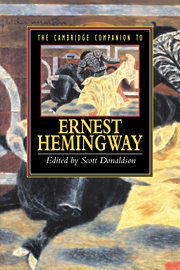Book contents
- Frontmatter
- 1 Introduction
- 2 Hemingway's journalism and the realist dilemma
- 3 1924
- 4 In Our Time, out of season
- 5 Brett and the other women in The Sun Also Rises
- 6 A Farewell to Arms
- 7 Hemingway's late fiction
- 8 Hemingway and politics
- 9 Hemingway and gender history
- 10 Hemingway, Hadley, and Paris
- 11 Hemingway's Spanish sensibility
- 12 The Cuban context of The Old Man and the Sea
- 13 Conclusion
- Selected Bibliography
- Index
- Series List
8 - Hemingway and politics
Published online by Cambridge University Press: 28 May 2006
- Frontmatter
- 1 Introduction
- 2 Hemingway's journalism and the realist dilemma
- 3 1924
- 4 In Our Time, out of season
- 5 Brett and the other women in The Sun Also Rises
- 6 A Farewell to Arms
- 7 Hemingway's late fiction
- 8 Hemingway and politics
- 9 Hemingway and gender history
- 10 Hemingway, Hadley, and Paris
- 11 Hemingway's Spanish sensibility
- 12 The Cuban context of The Old Man and the Sea
- 13 Conclusion
- Selected Bibliography
- Index
- Series List
Summary
With a few exceptions, Hemingway's biographers have discounted his interest in and understanding of politics. In his foreword to Ernest Hemingway: A Life Story, Carlos Baker summarizes many of the paradoxical, even contradictory, aspects of his complex subject, calling him politically a “fierce individualist . . . who believed that that government is best which governs least.” In his intellectual inventory of Hemingway in By Force of Will, Scott Donaldson follows suit, finding the consistent pattern of his political stance to be “the ideas of conservative Republicanism,” deeply distrustful of big government and jealous of the autonomy of the individual person. “Basically bored with politics” according to the biography by Jeffrey Meyers, Hemingway responded to the call of the left in the 1930s in a “half-hearted” way with To Have and Have Not, which represents “only a token commitment to the class struggle.” Kenneth Lynn's Hemingway brings a neoconservative as well as psychoanalytical perspective to the life and works, arguing that his political naivete allowed Hemingway to become a communist dupe. James Mellow's recent Hemingway: A Life without Consequences, discussing the writer's relationship to the communist magazine New Masses, characterizes his political stance as that of “an individualist first and liberal second.”
- Type
- Chapter
- Information
- The Cambridge Companion to Hemingway , pp. 149 - 169Publisher: Cambridge University PressPrint publication year: 1996
- 2
- Cited by

